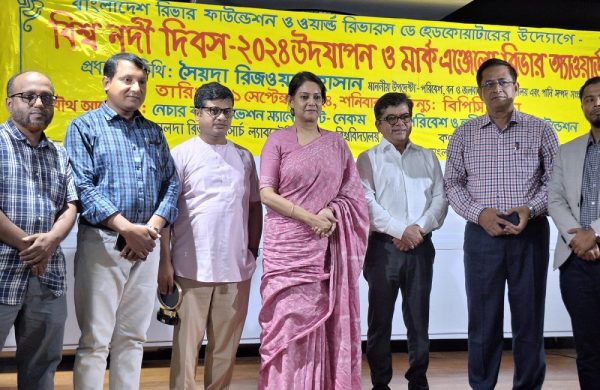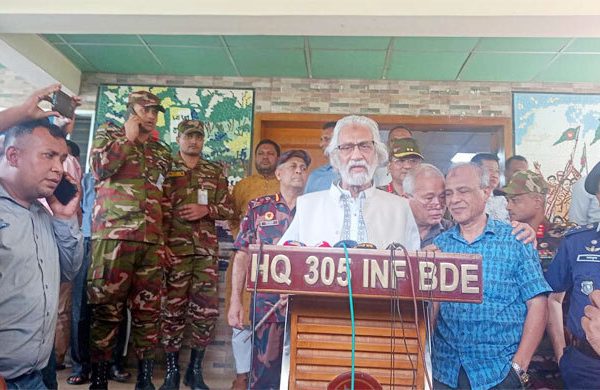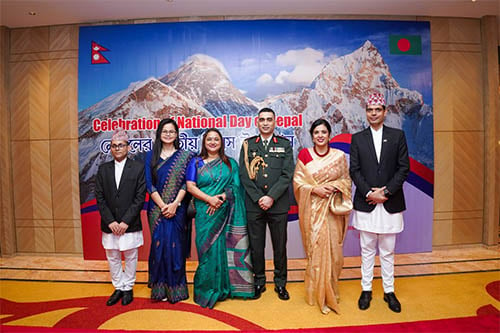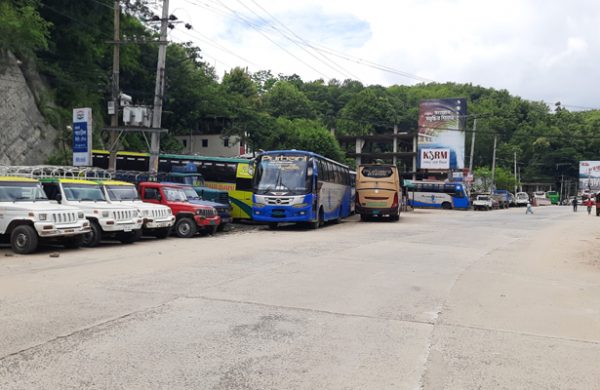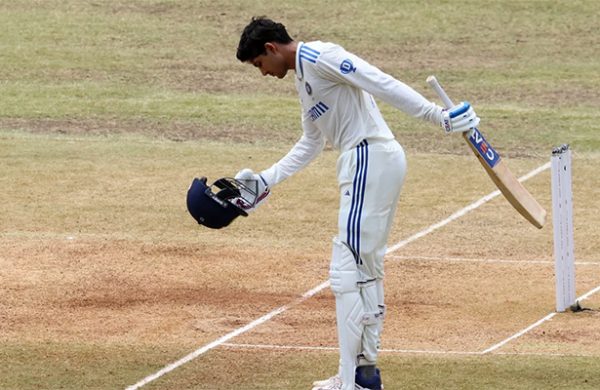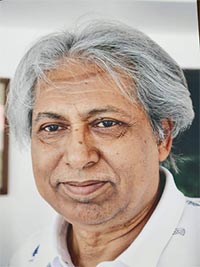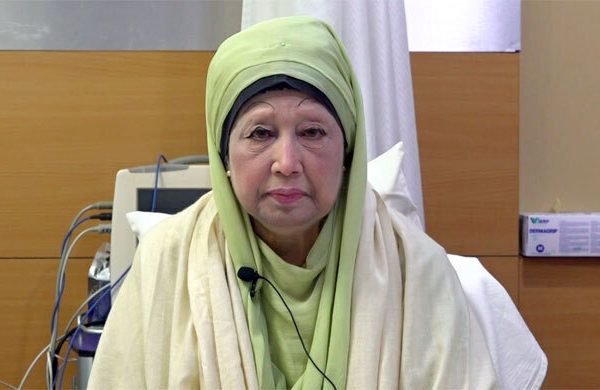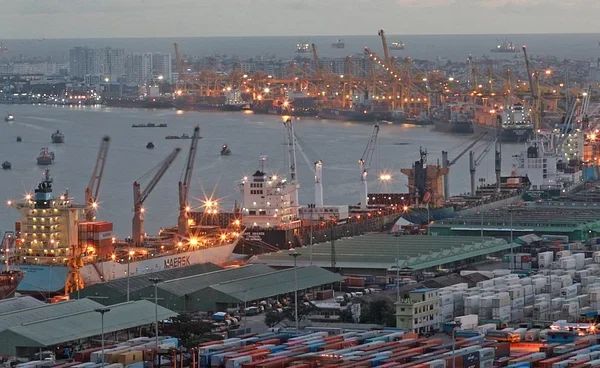Chicken traders defy govt-fixed prices, vegetables get pricier
- Update Time : Saturday, September 21, 2024
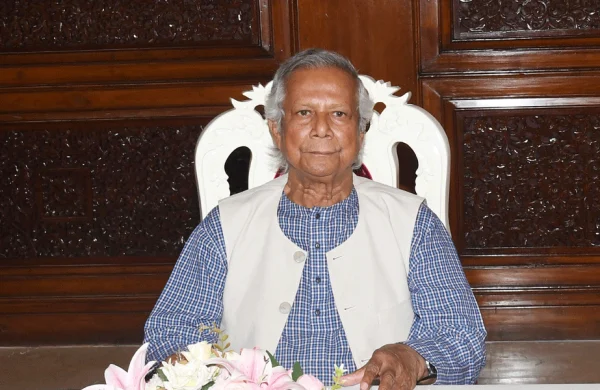
TDS Desk:
Prices of most vegetables and chicken rose at the capital’s kitchen markets on Friday despite several government initiatives, including price fixation.
Earlier on Sunday, the government fixed the prices of farm eggs, Sonali and broiler chickens at producer, wholesale and retail levels.
The retail prices of eggs, Sonali chickens and broilers have been fixed at Tk11.87, Tk269.64 and Tk179.59 respectively.
The price of the items increased soon after the price fixation by the Department of Livestock Services (DLS) in accordance with the Department of Agricultural Marketing (DAM).
During a visit to Mirpur 6, 13 and 11 kitchen markets on the day, this correspondent found that eggs and chicken are not available at the price fixed by the government.
The price of broiler chicken increased to Tk180-185 per kg from Tk170-175 per kg in a week, Sonali chicken price increased to Tk260-270 per kg from Tk250 per kg in a week, layer chicken was sold at Tk210 per kg and the endogenous chicken was sold at Tk500 per kg same as the previous week.
Broiler chicken price increased to Tk185-190 per kg and Sonali chicken price increased to Tk290 per kg in the middle of the week.
Farm egg price increased to Tk170 per dozen in the middle of the week, but farm egg was sold at Tk165 per dozen on Friday. Its price was Tk160 per dozen a week earlier.
Mokter Hosain, salesman at Milon Chicken Shop at Mirpur 6, said a decrease in supply resulting in an increase in chicken prices.
“Broiler and Sonali prices increased compared to the previous week but layer and endogenous chicken prices remain the same,” he said.
The price of beef was Tk750 per kg and mutton was sold at Tk1,150-1,200 per kg.
Ginger was sold at Tk280 per kg, local garlic was sold at Tk250 per kg, imported garlic was sold at Tk240 per kg, potato was sold at Tk55 per kg and onion was sold at Tk155-120 per kg.
Green papaya’s price has decreased from Tk40-50 per kg to Tk30 amidst price hikes for most vegetables.
The price of brinjal increased to Tk120 per kg from Tk80 per kg in a week, bitter gourd increased to Tk80 per kg from Tk60 per kg, pointed gourd price increased to Tk70-80 per kg from Tk50-60 per kg, yardlong bean increased to Tk100 per kg from Tk80 per kg, okra increased to Tk70-80 per kg from Tk60 per kg and cucumber increased to Tk70-80 per kg from Tk45-50 per kg.
The tomato was sold at Tk160 per kg, carrot was Tk160-180 per kg, bottle gourd was Tk50-60 per piece, the ribbed gourd was Tk80 per kg, Snake gourd was Tk80 per kg and sponge gourd was Tk70-80 per kg.
However, the price of green chilli has increased to Tk240 per kg from Tk160-200 per kg in a week.
Tilapia was sold at Tk260-280 per kg, koi was Tk260 per kg, rohu (1 kg) was sold at Tk300 per kg, big river shrimp was Tk1,100 per kg, and medium shrimp at Tk700-800 per kg.
Some mixed small river fish prices increased to Tk800 per kg from Tk600-700 per kg in a week.
Gas extraction and supply deals with 4 foreign companies halted
TDS Desk:
The interim government has decided against the proceeding with gas extraction and supply agreements with four foreign companies.
The companies are- India’s H Energy, Russia’s Gazprom, China’s Sinopec, and Uzbekistan’s Ariel, according to Energy and Mineral Resources Division officials.
Previous Awami League government selected these companies to make deals for gas extraction and supply, which had been developed and were nearing completion.
The officials said that the contracts will not be signed since the Quick Energy Supply Act, under which they were being processed, has been repealed by the interim government.
The present government will review the agreements and proceed with those it considers necessary, they added.
“The contracts will be awarded to interested companies through an open tender process,” Energy Secretary Md Nurul Alam said.
According to Energy Division officials, the agreements with Russia’s Gazprom to drill five gas wells in Bhola, with H Energy to import liquefied natural gas (LNG) via pipeline from India, and with Dipon Gas, a Bangladesh-based company, to build a pipeline from Bhomra to Khulna to supply the imported LNG were nearly finalised.
Additionally, discussions were ongoing with China’s Sinopec to drill five gas wells in Sylhet and with Uzbekistan’s Ariel to drill six wells and perform a workover on another.
Plans were underway to work on 17 onshore wells with Gazprom, Sinopec, and Ariel, and the Energy Division was in the final stages of approving the proposals after reviewing their financial details, they added.
Agreements under questions
Gazprom has drilled 20 wells in Bangladesh, including seven in Bhola under the Quick Energy Supply Act. The Russian company is currently drilling four more wells in Bhola under the same act. The Hasina government had planned to award them the contract to drill five additional wells in Bhola using the same approach.
Of the five wells, one is an exploration well and the remaining four are development wells. Gazprom proposed a budget of $120 million for the project. The Energy Division and Gazprom were negotiating this cost.
The deal with India’s H Energy Limited involved importing 0.8 to 1 MTPA (million tonnes per annum) of LNG to Bangladesh. After nearly four years of discussions, the agreement was in its final stages. The LNG was intended to be supplied to the power plants in Khulna and western regions of the country.
An official from Petrobangla, speaking on condition of anonymity, said discussions were ongoing with a company called Dipon Gas to establish a 65 km pipeline from Satkhira to Khulna for importing LNG from India.
Dipon Gas is a Bangladesh-based company with operations in India and Singapore, according to its website. The company has previously worked on installing the pipeline for importing fuel oil from Numaligarh in India and was involved in the construction of Excelerate Energy’s LNG terminal and pipeline at Maheshkhali.
Discussions were also ongoing with the Chinese company Sinopec regarding the drilling of five wells under Sylhet Gas Fields Company Limited. The wells include Rashidpur-11 and 13, Kailash Tila-9, Dupi Tila-1, and the only development well, Sylhet-11. These projects were estimated to cost around Tk1,200 crore.
Meanwhile, Uzbek company Ariel was in the final stages of negotiations to drill seven wells under Bangladesh Gas Fields Company Limited across various districts. The Energy Division had completed the evaluation of Ariel’s proposal to drill and renovate these wells. The proposal included drilling four new wells and performing workovers on three existing ones, with a proposed cost of $131 million.
High-level delegation to visit Khagrachhari, Rangamati
BSS, Dhaka:
A high-level delegation led by Home Adviser Lt Gen Md Jahangir Alam Chowdhury (Retd.) is going to visit Khagrachhari and Rangamati districts on Saturday.
Other members of the delegation are – Chittagong Hill Tracts Affairs (CHT) Adviser Supradip Chakma, LGRD Affairs Adviser A. F. Hassan Ariff and special assistant to the Chief Adviser on Defence and National Unity Development Lt Gen (retd) Abdul Hafiz.
The government has earlier expressed profound shock and sorrow at the casualties in the attacks at different places, centering on the death of a person in mass beating at CHT on 18 September.
A message, sent from the Chief Adviser’s press wing, said that the government has been working sincerely to resolve the problems created in Khagrachhari and Rangamati.
The law enforcement agencies have been asked to show maximum tolerance and ensure security of the people living in the three CHT districts, it reads.
Mentioning that the government is committed to ensuring peace, amity and harmony in the CHT, the government has asked all not to take law into their own hands or engage in destructive activities.
Damaging any property is punishable and grave offence, it warned.
“Fair probes into all incidents related to violence and the trial of those responsible will be ensured,” the statement read.
To this end, the government is going to form a very powerful investigation committee.
Besides, the government has asked the authorities concerned to ensure proper treatment for the injured.
With a packed 3-day schedule, Chief Adviser to deliver speech at UNGA 27 Sept
UNB, Dhaka:
Chief Adviser Prof Muhammad Yunus is set to leave Dhaka on September 23 to attend the 79th United Nations General Assembly (UNGA) in New York which is seen as a big opportunity for him to share his government’s priorities following the student-led mass uprising, and economic plans including which areas specifically the international community can be helpful in strengthening and stabilizing Bangladesh’s economy.
The first day of the high-level General Debate will be held on Tuesday, September 24.
“The Chief Adviser will stay three days in New York and he will leave New York on September 27,” Foreign Adviser Md Touhid Hossain told reporters on Saturday at a media briefing at Foreign Service Academy. He said the Chief Adviser will go to New York on a commercial flight.
The Chief Adviser will deliver his speech on September 27, said the Foreign Adviser.
Hossain said a major political changeover has taken place in Bangladesh and they want to let people know so that no confusion remains regarding what happened in Bangladesh. He said Prof Yunus is highly respected globally and all countries will take his remarks seriously.
Hossain said he will go to New York by a separate commercial flight two days prior to Chief Adviser’s arrival in New York.
Asked about any possibility to have a meeting with Indian Prime Minister Narendra Modi, the Foreign Adviser said it seems there is no possibility as Modi is going there a bit early while Chief Adviser Yunus is going there a bit late.
The Chief Adviser will have meetings—bilateral and call on—with prime ministers of the Netherlands, Pakistan, Nepal and the President of the European Union, US Secretary of State, UN Secretary-General, UN Human Rights chief, the World Bank President, and USAID Administrator, said the Foreign Adviser.
The Foreign Adviser, however, said he will have a bilateral meeting with Indian External Affairs Minister S Jaishankar on the sidelines.
Hossain said reforms and human rights will be highlighted and the government will continue to make commitments to take steps on human rights issues.
“I can’t justify why there were large delegations in the past. But the current government wants to avoid unnecessary expenses,” he said.
The Foreign Adviser said, this time the delegation will have 57 members, and a big number of them are security personnel. On previous occasions, the Bangladesh delegation was varied between 300 and 100 plus.
Hossain said only those with direct responsibilities at the UNGA will accompany the Chief Adviser.
Bangladesh will host a high-level reception on September 24 marking 50 years of Bangladesh’s UN membership.
The theme of the General Debate is “Leaving no one behind: Acting together for the advancement of peace, sustainable development and human dignity for present and future generations.”
South Asian affairs expert Michael Kugelman previously said Prof Yunus’ participation at the 79th UN General Assembly (UNGA) will be a big opportunity for him to share his government’s economic plans, including which areas specifically the international community can be helpful in strengthening and stabilizing Bangladesh’s economy.
“He would be speaking in New York on the biggest global platform since he took over the role of adviser leading the interim government,” said Kugelman, Director of the South Asia Institute at Wilson Center in Washington, D.C.
Kugelman said there are several things that Prof Yunus could do, several things that he could say.
“I think that above all he should lay out a vision for governance, the goals of the interim government, his plans for reforms and his efforts to push for the restoration of democracy.”
Kugelman said he thinks that Prof Yunus’ platform at the UNGA would give him an opportunity to weigh in on what is arguably Bangladesh’s biggest humanitarian challenge, the Rohingya refugee issue.
“I think that it would be useful for him to make a pitch for international assistance or more international assistance for Rohingya refugees, which would be an especially important pitch for two reasons,” he said.
The 79th session of the UN General Assembly (UNGA 79) opened on September 10.
Meanwhile, the heads of states and governments will gather at UN Headquarters in New York on September 22-23 to address the critical challenges and gaps in global governance exposed by recent global shocks.
The Summit of the Future, the first of its kind, will bring together leaders, advocates, and activists of all ages to determine how our international system can better meet the needs of current and future generations.
Countries must use a once-in-a-generation UN summit to address current and emerging global challenges and reform outdated international institutions, Secretary-General António Guterres said in New York.
Guterres was speaking as negotiations for the Summit of the Future, which opens at UN Headquarters on Sunday, enter the final stretch.
“I have one overriding message today: an appeal to Member States for a spirit of compromise. Show the world what we can do, when we work together,” he said.
‘An essential first step’
The two-day Summit of the Future is “an essential first step towards making global institutions more legitimate, effective, and fit for the world of today and tomorrow,” Guterres told journalists.
He said work already done in the lead-up reveals “potential breakthroughs on a number of important fronts”.
This includes “the strongest language on Security Council reform in a generation—and the most concrete step towards Council enlargement since 1963,” the first-ever governance measures for Artificial Intelligence (AI) and other technologies, and advancements in reforming the international financial architecture.
Other items cover financing for the Sustainable Development Goals (SDGs) and commitment to advance an SDG Stimulus to boost financial support to developing countries.
“It would be tragic if all of these would be lost,” he warned.
Challenges, crises and conflict
Guterres said the Summit is “so critical” because “international challenges are moving faster than our ability to solve them.”
He pointed to “out-of-control geo-political divisions and runaway conflicts – not least in Ukraine, Gaza, Sudan and beyond,” in addition to “runaway” climate change, inequalities and debt, and the development of AI and other technologies that lack guidance or guardrails.
“Crises are interacting and feeding off each other – for example, as digital technologies spread climate disinformation that deepens distrust and fuels polarization,” he said.
Reform multilateral institutions
Meanwhile, multilateral institutions “born in a bygone era for a bygone world” simply cannot keep up.
Guterres said so many of the challenges the world is facing today were not on the radar 80 years ago when these institutions were created.
“Our founders understood that times would change,” he said. “They understood that the values that underpin our global institutions are timeless – but the institutions themselves cannot be frozen in time.”
An ever-changing world
He said the peacebuilders back then could not have predicted the changes that have occurred over the past eight decades.
They include the independence movements, the economic and geopolitical rise of many developing countries, catastrophic climate consequences, space exploration, and the development of the Internet, smartphones and social media, which are boosted by AI.
“Like our founders, we cannot know precisely what the future holds,” he acknowledged.
“But we don’t need a crystal ball to see that 21st century challenges require problem-solving mechanisms that are more effective, networked and inclusive; that serious power imbalances in global institutions must be adjusted and updated; and that our institutions must draw on the expertise and representation of all of humanity.”
Although change will not happen overnight, “it can start Saturday,” he insisted.
Finish the job
Member States attending the Summit are expected to adopt a Pact for the Future, with a Global Digital Compact and Declaration on Future Generations annexed to it.
Guterres expressed hope that they will “do everything possible” to get these documents “over the finish line”.
“We can’t create a future fit for our grandchildren with systems built for our grandparents,” he said, stressing that the Summit “cannot fail”.
World leaders
More than 130 Heads of State and Government are scheduled to attend the Summit of the Future, which is taking place from 22-23 September – just ahead of the annual debate in the UN General Assembly.
The Summit will be preceded by two “action days” where non-governmental organizations (NGOs), academics and private sector representatives will engage on the main themes.


